Report on Professional Ethics: Conduct and Practices at HSBC
VerifiedAdded on 2021/01/01
|14
|4100
|434
Report
AI Summary
This report delves into the realm of professional ethics, focusing on the context of HSBC, a major financial institution. It explores fundamental principles of ethical behaviour, including integrity, objectivity, and confidentiality, as well as the legal, regulatory, and ethical requirements affecting the accounting and finance sector. The report examines the role of professional bodies, the importance of adhering to codes of conduct, and the risks associated with improper practices, emphasizing the need for vigilance. It covers ethical conduct with clients, suppliers, and colleagues, the significance of objectivity, and adherence to organizational values. Furthermore, it addresses the reporting of unethical behaviour, including breaches of confidentiality and suspected illegal acts, along with strategies to prevent ethical conflicts. Finally, the report highlights the importance of an ethical approach to sustainability and the responsibilities of finance professionals in upholding these principles.
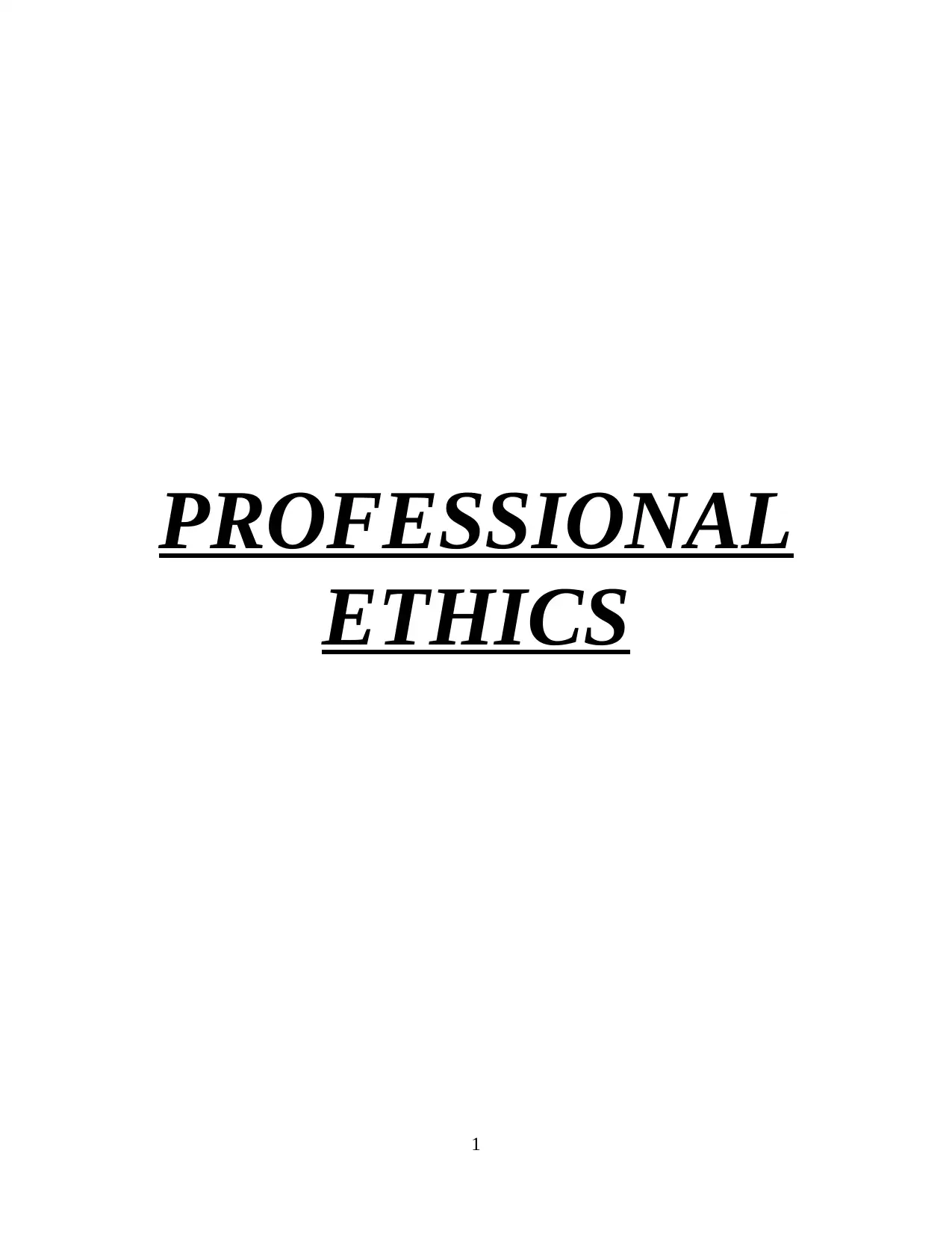
PROFESSIONAL
ETHICS
1
ETHICS
1
Paraphrase This Document
Need a fresh take? Get an instant paraphrase of this document with our AI Paraphraser
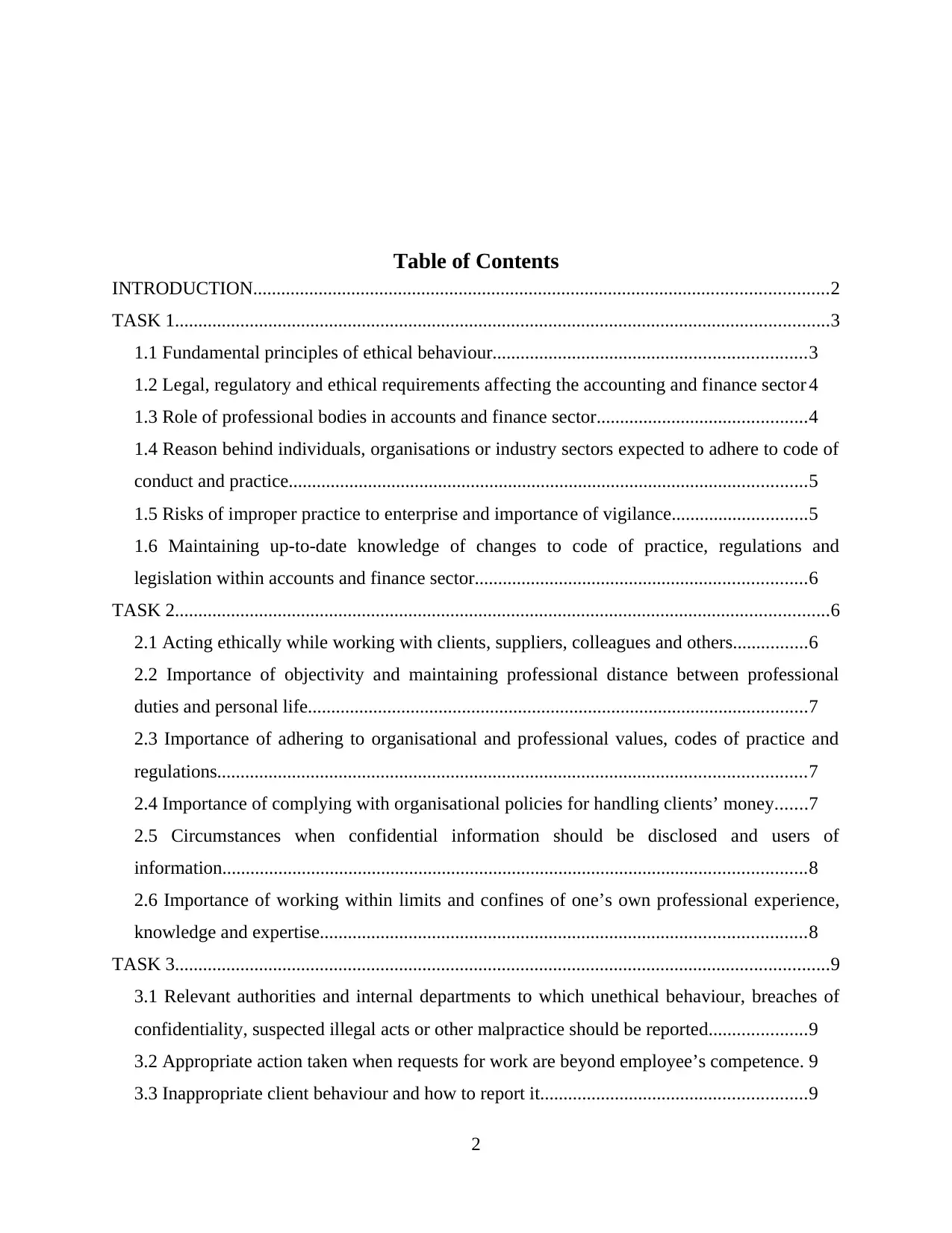
Table of Contents
INTRODUCTION...........................................................................................................................2
TASK 1............................................................................................................................................3
1.1 Fundamental principles of ethical behaviour...................................................................3
1.2 Legal, regulatory and ethical requirements affecting the accounting and finance sector 4
1.3 Role of professional bodies in accounts and finance sector.............................................4
1.4 Reason behind individuals, organisations or industry sectors expected to adhere to code of
conduct and practice...............................................................................................................5
1.5 Risks of improper practice to enterprise and importance of vigilance.............................5
1.6 Maintaining up-to-date knowledge of changes to code of practice, regulations and
legislation within accounts and finance sector.......................................................................6
TASK 2............................................................................................................................................6
2.1 Acting ethically while working with clients, suppliers, colleagues and others................6
2.2 Importance of objectivity and maintaining professional distance between professional
duties and personal life...........................................................................................................7
2.3 Importance of adhering to organisational and professional values, codes of practice and
regulations..............................................................................................................................7
2.4 Importance of complying with organisational policies for handling clients’ money.......7
2.5 Circumstances when confidential information should be disclosed and users of
information.............................................................................................................................8
2.6 Importance of working within limits and confines of one’s own professional experience,
knowledge and expertise........................................................................................................8
TASK 3............................................................................................................................................9
3.1 Relevant authorities and internal departments to which unethical behaviour, breaches of
confidentiality, suspected illegal acts or other malpractice should be reported.....................9
3.2 Appropriate action taken when requests for work are beyond employee’s competence. 9
3.3 Inappropriate client behaviour and how to report it.........................................................9
2
INTRODUCTION...........................................................................................................................2
TASK 1............................................................................................................................................3
1.1 Fundamental principles of ethical behaviour...................................................................3
1.2 Legal, regulatory and ethical requirements affecting the accounting and finance sector 4
1.3 Role of professional bodies in accounts and finance sector.............................................4
1.4 Reason behind individuals, organisations or industry sectors expected to adhere to code of
conduct and practice...............................................................................................................5
1.5 Risks of improper practice to enterprise and importance of vigilance.............................5
1.6 Maintaining up-to-date knowledge of changes to code of practice, regulations and
legislation within accounts and finance sector.......................................................................6
TASK 2............................................................................................................................................6
2.1 Acting ethically while working with clients, suppliers, colleagues and others................6
2.2 Importance of objectivity and maintaining professional distance between professional
duties and personal life...........................................................................................................7
2.3 Importance of adhering to organisational and professional values, codes of practice and
regulations..............................................................................................................................7
2.4 Importance of complying with organisational policies for handling clients’ money.......7
2.5 Circumstances when confidential information should be disclosed and users of
information.............................................................................................................................8
2.6 Importance of working within limits and confines of one’s own professional experience,
knowledge and expertise........................................................................................................8
TASK 3............................................................................................................................................9
3.1 Relevant authorities and internal departments to which unethical behaviour, breaches of
confidentiality, suspected illegal acts or other malpractice should be reported.....................9
3.2 Appropriate action taken when requests for work are beyond employee’s competence. 9
3.3 Inappropriate client behaviour and how to report it.........................................................9
2
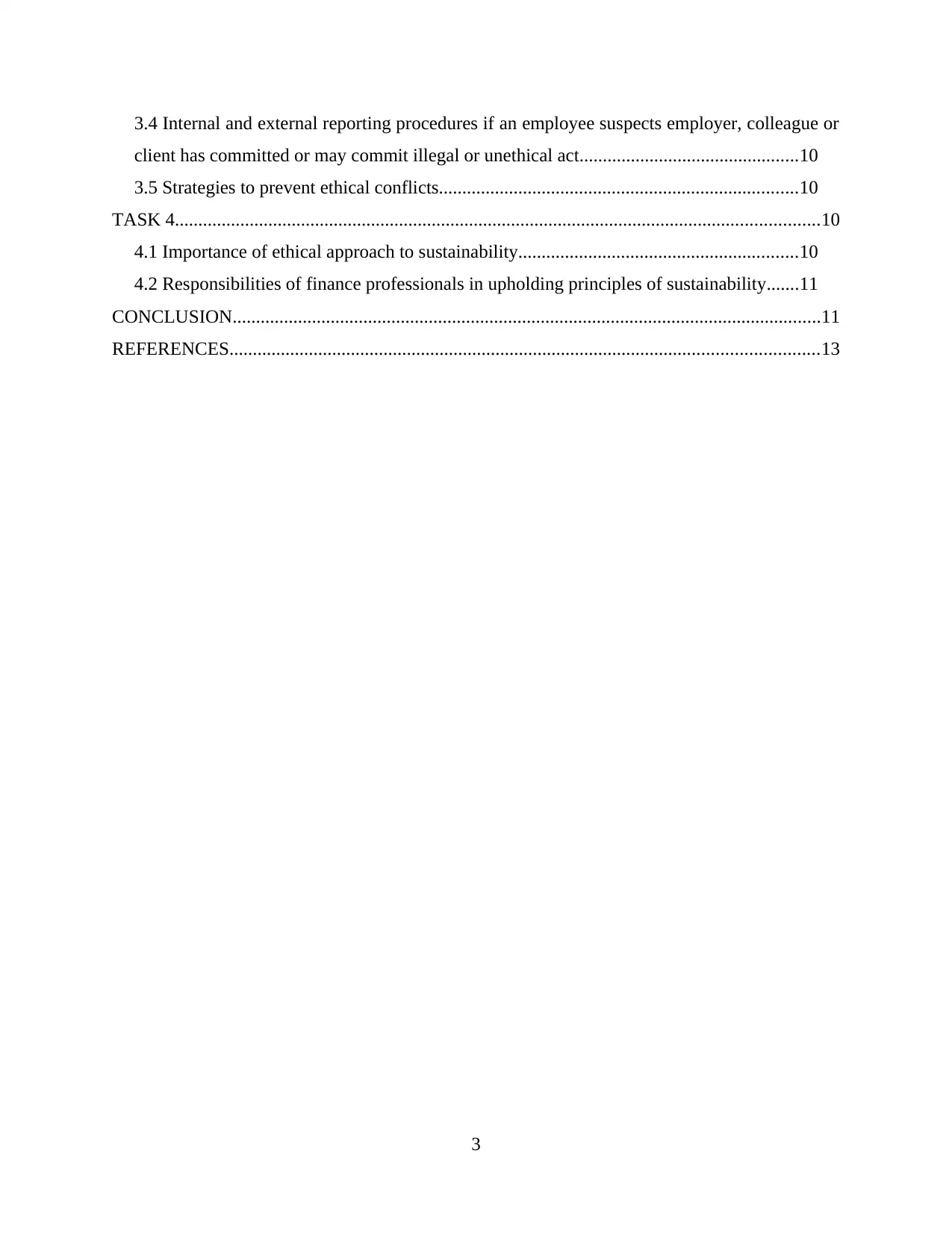
3.4 Internal and external reporting procedures if an employee suspects employer, colleague or
client has committed or may commit illegal or unethical act...............................................10
3.5 Strategies to prevent ethical conflicts.............................................................................10
TASK 4..........................................................................................................................................10
4.1 Importance of ethical approach to sustainability............................................................10
4.2 Responsibilities of finance professionals in upholding principles of sustainability.......11
CONCLUSION..............................................................................................................................11
REFERENCES..............................................................................................................................13
3
client has committed or may commit illegal or unethical act...............................................10
3.5 Strategies to prevent ethical conflicts.............................................................................10
TASK 4..........................................................................................................................................10
4.1 Importance of ethical approach to sustainability............................................................10
4.2 Responsibilities of finance professionals in upholding principles of sustainability.......11
CONCLUSION..............................................................................................................................11
REFERENCES..............................................................................................................................13
3
⊘ This is a preview!⊘
Do you want full access?
Subscribe today to unlock all pages.

Trusted by 1+ million students worldwide

4
Paraphrase This Document
Need a fresh take? Get an instant paraphrase of this document with our AI Paraphraser
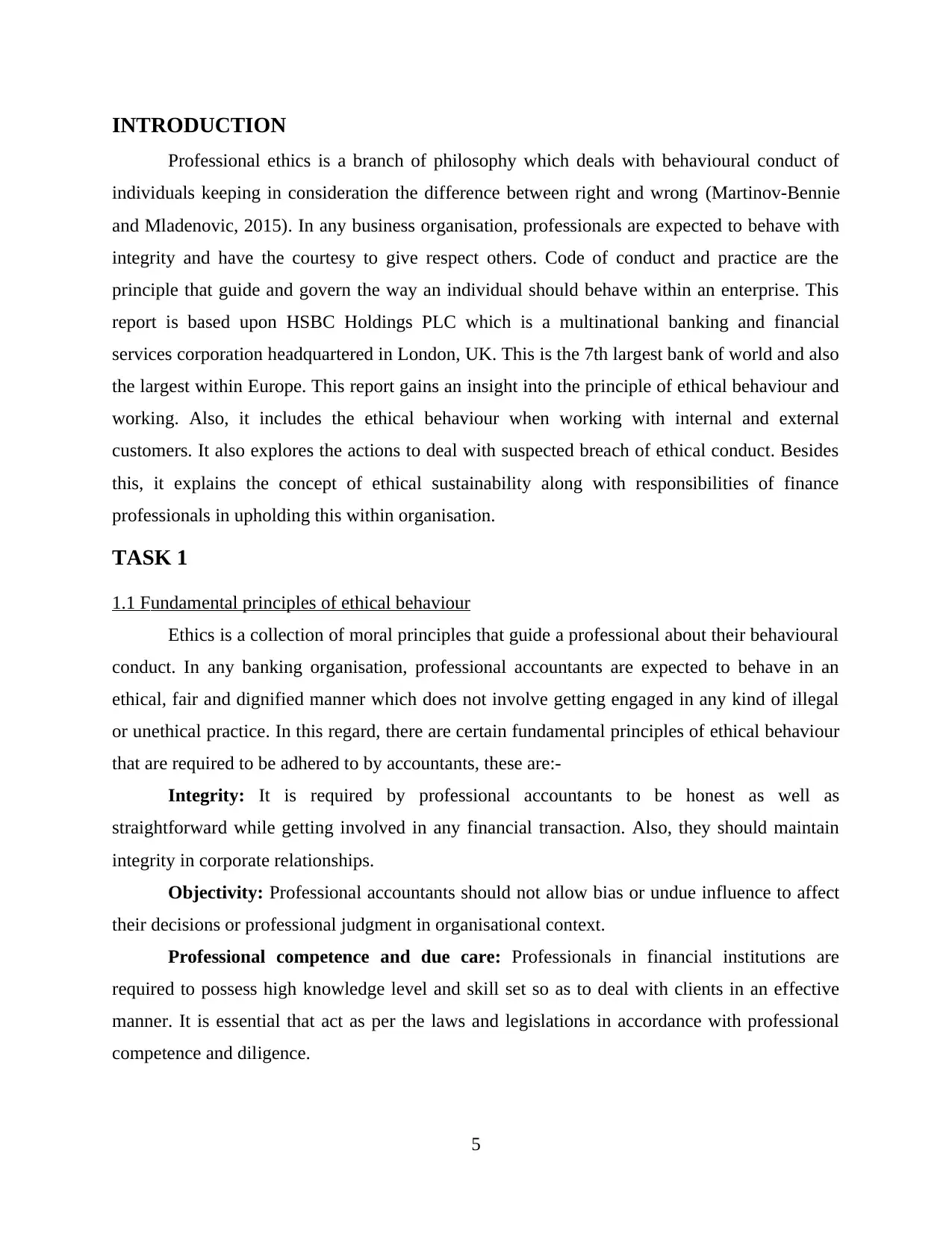
INTRODUCTION
Professional ethics is a branch of philosophy which deals with behavioural conduct of
individuals keeping in consideration the difference between right and wrong (Martinov-Bennie
and Mladenovic, 2015). In any business organisation, professionals are expected to behave with
integrity and have the courtesy to give respect others. Code of conduct and practice are the
principle that guide and govern the way an individual should behave within an enterprise. This
report is based upon HSBC Holdings PLC which is a multinational banking and financial
services corporation headquartered in London, UK. This is the 7th largest bank of world and also
the largest within Europe. This report gains an insight into the principle of ethical behaviour and
working. Also, it includes the ethical behaviour when working with internal and external
customers. It also explores the actions to deal with suspected breach of ethical conduct. Besides
this, it explains the concept of ethical sustainability along with responsibilities of finance
professionals in upholding this within organisation.
TASK 1
1.1 Fundamental principles of ethical behaviour
Ethics is a collection of moral principles that guide a professional about their behavioural
conduct. In any banking organisation, professional accountants are expected to behave in an
ethical, fair and dignified manner which does not involve getting engaged in any kind of illegal
or unethical practice. In this regard, there are certain fundamental principles of ethical behaviour
that are required to be adhered to by accountants, these are:-
Integrity: It is required by professional accountants to be honest as well as
straightforward while getting involved in any financial transaction. Also, they should maintain
integrity in corporate relationships.
Objectivity: Professional accountants should not allow bias or undue influence to affect
their decisions or professional judgment in organisational context.
Professional competence and due care: Professionals in financial institutions are
required to possess high knowledge level and skill set so as to deal with clients in an effective
manner. It is essential that act as per the laws and legislations in accordance with professional
competence and diligence.
5
Professional ethics is a branch of philosophy which deals with behavioural conduct of
individuals keeping in consideration the difference between right and wrong (Martinov-Bennie
and Mladenovic, 2015). In any business organisation, professionals are expected to behave with
integrity and have the courtesy to give respect others. Code of conduct and practice are the
principle that guide and govern the way an individual should behave within an enterprise. This
report is based upon HSBC Holdings PLC which is a multinational banking and financial
services corporation headquartered in London, UK. This is the 7th largest bank of world and also
the largest within Europe. This report gains an insight into the principle of ethical behaviour and
working. Also, it includes the ethical behaviour when working with internal and external
customers. It also explores the actions to deal with suspected breach of ethical conduct. Besides
this, it explains the concept of ethical sustainability along with responsibilities of finance
professionals in upholding this within organisation.
TASK 1
1.1 Fundamental principles of ethical behaviour
Ethics is a collection of moral principles that guide a professional about their behavioural
conduct. In any banking organisation, professional accountants are expected to behave in an
ethical, fair and dignified manner which does not involve getting engaged in any kind of illegal
or unethical practice. In this regard, there are certain fundamental principles of ethical behaviour
that are required to be adhered to by accountants, these are:-
Integrity: It is required by professional accountants to be honest as well as
straightforward while getting involved in any financial transaction. Also, they should maintain
integrity in corporate relationships.
Objectivity: Professional accountants should not allow bias or undue influence to affect
their decisions or professional judgment in organisational context.
Professional competence and due care: Professionals in financial institutions are
required to possess high knowledge level and skill set so as to deal with clients in an effective
manner. It is essential that act as per the laws and legislations in accordance with professional
competence and diligence.
5
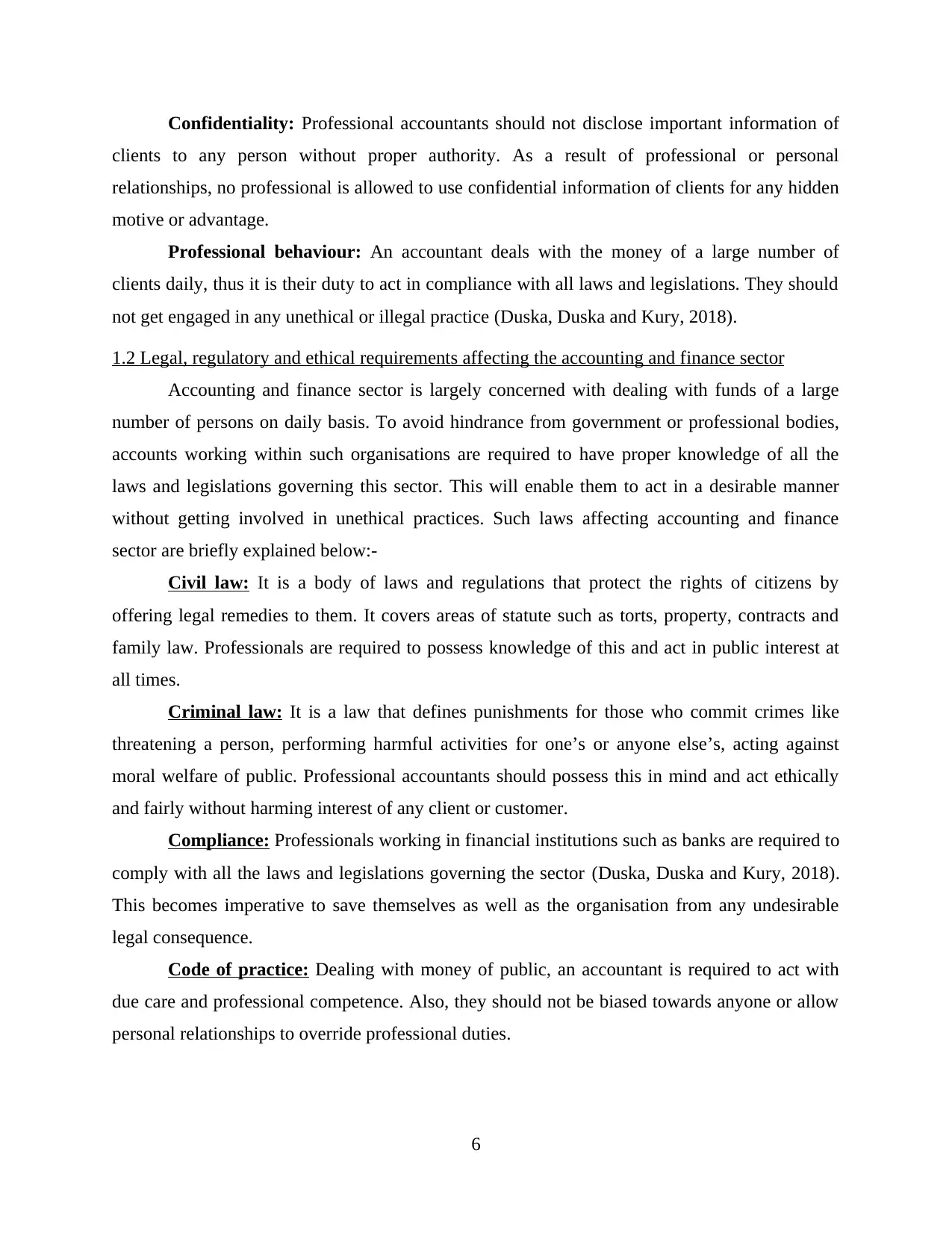
Confidentiality: Professional accountants should not disclose important information of
clients to any person without proper authority. As a result of professional or personal
relationships, no professional is allowed to use confidential information of clients for any hidden
motive or advantage.
Professional behaviour: An accountant deals with the money of a large number of
clients daily, thus it is their duty to act in compliance with all laws and legislations. They should
not get engaged in any unethical or illegal practice (Duska, Duska and Kury, 2018).
1.2 Legal, regulatory and ethical requirements affecting the accounting and finance sector
Accounting and finance sector is largely concerned with dealing with funds of a large
number of persons on daily basis. To avoid hindrance from government or professional bodies,
accounts working within such organisations are required to have proper knowledge of all the
laws and legislations governing this sector. This will enable them to act in a desirable manner
without getting involved in unethical practices. Such laws affecting accounting and finance
sector are briefly explained below:-
Civil law: It is a body of laws and regulations that protect the rights of citizens by
offering legal remedies to them. It covers areas of statute such as torts, property, contracts and
family law. Professionals are required to possess knowledge of this and act in public interest at
all times.
Criminal law: It is a law that defines punishments for those who commit crimes like
threatening a person, performing harmful activities for one’s or anyone else’s, acting against
moral welfare of public. Professional accountants should possess this in mind and act ethically
and fairly without harming interest of any client or customer.
Compliance: Professionals working in financial institutions such as banks are required to
comply with all the laws and legislations governing the sector (Duska, Duska and Kury, 2018).
This becomes imperative to save themselves as well as the organisation from any undesirable
legal consequence.
Code of practice: Dealing with money of public, an accountant is required to act with
due care and professional competence. Also, they should not be biased towards anyone or allow
personal relationships to override professional duties.
6
clients to any person without proper authority. As a result of professional or personal
relationships, no professional is allowed to use confidential information of clients for any hidden
motive or advantage.
Professional behaviour: An accountant deals with the money of a large number of
clients daily, thus it is their duty to act in compliance with all laws and legislations. They should
not get engaged in any unethical or illegal practice (Duska, Duska and Kury, 2018).
1.2 Legal, regulatory and ethical requirements affecting the accounting and finance sector
Accounting and finance sector is largely concerned with dealing with funds of a large
number of persons on daily basis. To avoid hindrance from government or professional bodies,
accounts working within such organisations are required to have proper knowledge of all the
laws and legislations governing this sector. This will enable them to act in a desirable manner
without getting involved in unethical practices. Such laws affecting accounting and finance
sector are briefly explained below:-
Civil law: It is a body of laws and regulations that protect the rights of citizens by
offering legal remedies to them. It covers areas of statute such as torts, property, contracts and
family law. Professionals are required to possess knowledge of this and act in public interest at
all times.
Criminal law: It is a law that defines punishments for those who commit crimes like
threatening a person, performing harmful activities for one’s or anyone else’s, acting against
moral welfare of public. Professional accountants should possess this in mind and act ethically
and fairly without harming interest of any client or customer.
Compliance: Professionals working in financial institutions such as banks are required to
comply with all the laws and legislations governing the sector (Duska, Duska and Kury, 2018).
This becomes imperative to save themselves as well as the organisation from any undesirable
legal consequence.
Code of practice: Dealing with money of public, an accountant is required to act with
due care and professional competence. Also, they should not be biased towards anyone or allow
personal relationships to override professional duties.
6
⊘ This is a preview!⊘
Do you want full access?
Subscribe today to unlock all pages.

Trusted by 1+ million students worldwide
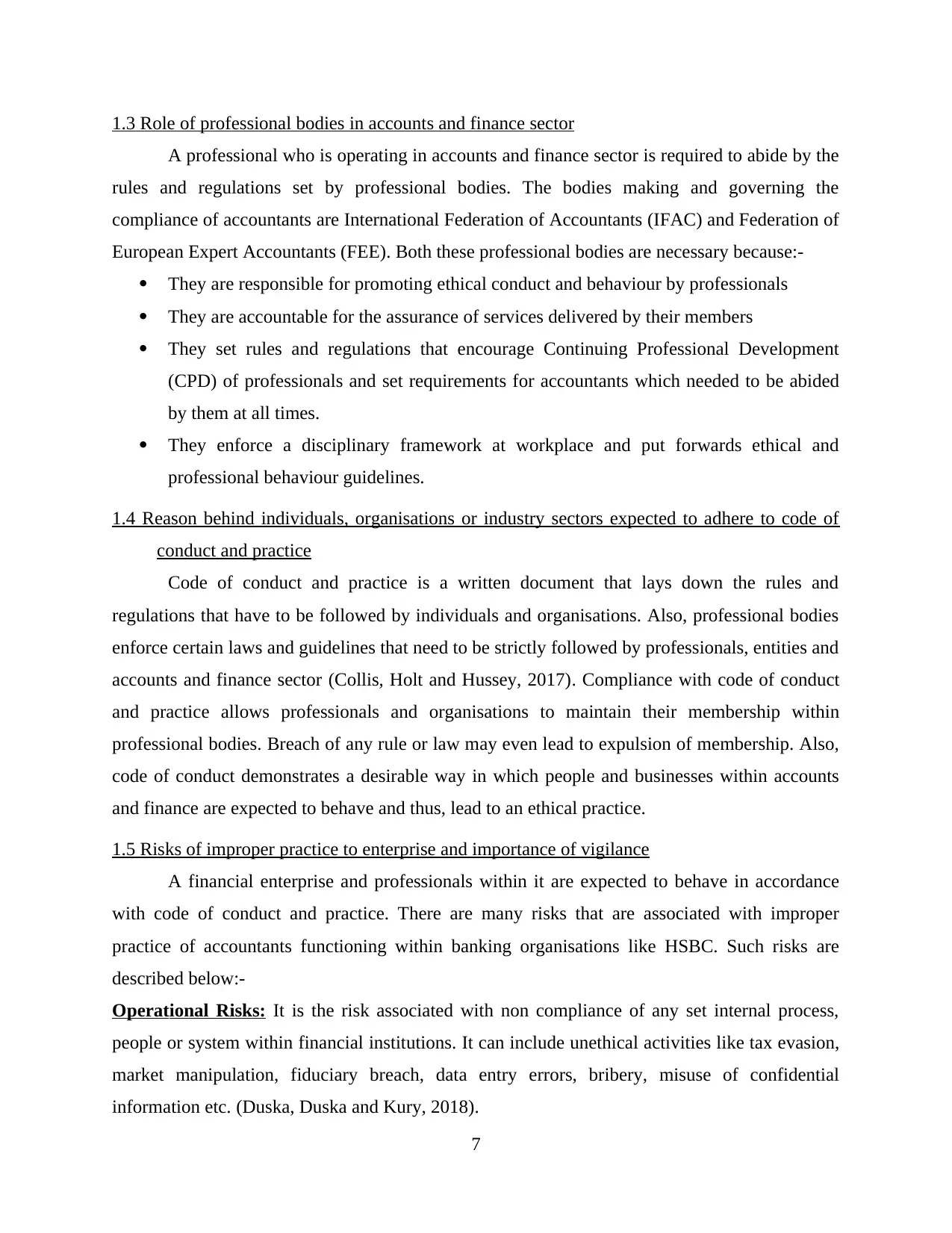
1.3 Role of professional bodies in accounts and finance sector
A professional who is operating in accounts and finance sector is required to abide by the
rules and regulations set by professional bodies. The bodies making and governing the
compliance of accountants are International Federation of Accountants (IFAC) and Federation of
European Expert Accountants (FEE). Both these professional bodies are necessary because:-
They are responsible for promoting ethical conduct and behaviour by professionals
They are accountable for the assurance of services delivered by their members
They set rules and regulations that encourage Continuing Professional Development
(CPD) of professionals and set requirements for accountants which needed to be abided
by them at all times.
They enforce a disciplinary framework at workplace and put forwards ethical and
professional behaviour guidelines.
1.4 Reason behind individuals, organisations or industry sectors expected to adhere to code of
conduct and practice
Code of conduct and practice is a written document that lays down the rules and
regulations that have to be followed by individuals and organisations. Also, professional bodies
enforce certain laws and guidelines that need to be strictly followed by professionals, entities and
accounts and finance sector (Collis, Holt and Hussey, 2017). Compliance with code of conduct
and practice allows professionals and organisations to maintain their membership within
professional bodies. Breach of any rule or law may even lead to expulsion of membership. Also,
code of conduct demonstrates a desirable way in which people and businesses within accounts
and finance are expected to behave and thus, lead to an ethical practice.
1.5 Risks of improper practice to enterprise and importance of vigilance
A financial enterprise and professionals within it are expected to behave in accordance
with code of conduct and practice. There are many risks that are associated with improper
practice of accountants functioning within banking organisations like HSBC. Such risks are
described below:-
Operational Risks: It is the risk associated with non compliance of any set internal process,
people or system within financial institutions. It can include unethical activities like tax evasion,
market manipulation, fiduciary breach, data entry errors, bribery, misuse of confidential
information etc. (Duska, Duska and Kury, 2018).
7
A professional who is operating in accounts and finance sector is required to abide by the
rules and regulations set by professional bodies. The bodies making and governing the
compliance of accountants are International Federation of Accountants (IFAC) and Federation of
European Expert Accountants (FEE). Both these professional bodies are necessary because:-
They are responsible for promoting ethical conduct and behaviour by professionals
They are accountable for the assurance of services delivered by their members
They set rules and regulations that encourage Continuing Professional Development
(CPD) of professionals and set requirements for accountants which needed to be abided
by them at all times.
They enforce a disciplinary framework at workplace and put forwards ethical and
professional behaviour guidelines.
1.4 Reason behind individuals, organisations or industry sectors expected to adhere to code of
conduct and practice
Code of conduct and practice is a written document that lays down the rules and
regulations that have to be followed by individuals and organisations. Also, professional bodies
enforce certain laws and guidelines that need to be strictly followed by professionals, entities and
accounts and finance sector (Collis, Holt and Hussey, 2017). Compliance with code of conduct
and practice allows professionals and organisations to maintain their membership within
professional bodies. Breach of any rule or law may even lead to expulsion of membership. Also,
code of conduct demonstrates a desirable way in which people and businesses within accounts
and finance are expected to behave and thus, lead to an ethical practice.
1.5 Risks of improper practice to enterprise and importance of vigilance
A financial enterprise and professionals within it are expected to behave in accordance
with code of conduct and practice. There are many risks that are associated with improper
practice of accountants functioning within banking organisations like HSBC. Such risks are
described below:-
Operational Risks: It is the risk associated with non compliance of any set internal process,
people or system within financial institutions. It can include unethical activities like tax evasion,
market manipulation, fiduciary breach, data entry errors, bribery, misuse of confidential
information etc. (Duska, Duska and Kury, 2018).
7
Paraphrase This Document
Need a fresh take? Get an instant paraphrase of this document with our AI Paraphraser
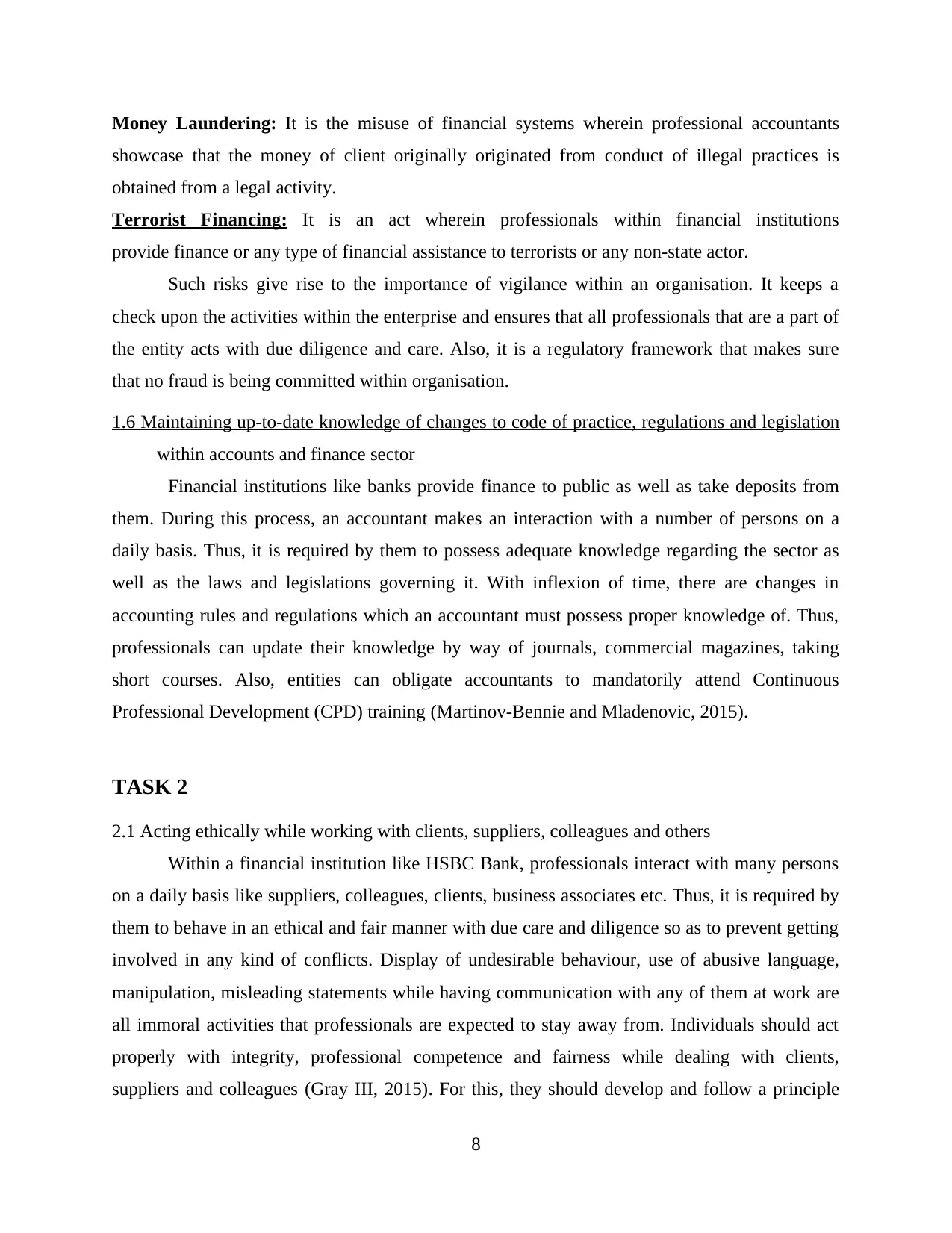
Money Laundering: It is the misuse of financial systems wherein professional accountants
showcase that the money of client originally originated from conduct of illegal practices is
obtained from a legal activity.
Terrorist Financing: It is an act wherein professionals within financial institutions
provide finance or any type of financial assistance to terrorists or any non-state actor.
Such risks give rise to the importance of vigilance within an organisation. It keeps a
check upon the activities within the enterprise and ensures that all professionals that are a part of
the entity acts with due diligence and care. Also, it is a regulatory framework that makes sure
that no fraud is being committed within organisation.
1.6 Maintaining up-to-date knowledge of changes to code of practice, regulations and legislation
within accounts and finance sector
Financial institutions like banks provide finance to public as well as take deposits from
them. During this process, an accountant makes an interaction with a number of persons on a
daily basis. Thus, it is required by them to possess adequate knowledge regarding the sector as
well as the laws and legislations governing it. With inflexion of time, there are changes in
accounting rules and regulations which an accountant must possess proper knowledge of. Thus,
professionals can update their knowledge by way of journals, commercial magazines, taking
short courses. Also, entities can obligate accountants to mandatorily attend Continuous
Professional Development (CPD) training (Martinov-Bennie and Mladenovic, 2015).
TASK 2
2.1 Acting ethically while working with clients, suppliers, colleagues and others
Within a financial institution like HSBC Bank, professionals interact with many persons
on a daily basis like suppliers, colleagues, clients, business associates etc. Thus, it is required by
them to behave in an ethical and fair manner with due care and diligence so as to prevent getting
involved in any kind of conflicts. Display of undesirable behaviour, use of abusive language,
manipulation, misleading statements while having communication with any of them at work are
all immoral activities that professionals are expected to stay away from. Individuals should act
properly with integrity, professional competence and fairness while dealing with clients,
suppliers and colleagues (Gray III, 2015). For this, they should develop and follow a principle
8
showcase that the money of client originally originated from conduct of illegal practices is
obtained from a legal activity.
Terrorist Financing: It is an act wherein professionals within financial institutions
provide finance or any type of financial assistance to terrorists or any non-state actor.
Such risks give rise to the importance of vigilance within an organisation. It keeps a
check upon the activities within the enterprise and ensures that all professionals that are a part of
the entity acts with due diligence and care. Also, it is a regulatory framework that makes sure
that no fraud is being committed within organisation.
1.6 Maintaining up-to-date knowledge of changes to code of practice, regulations and legislation
within accounts and finance sector
Financial institutions like banks provide finance to public as well as take deposits from
them. During this process, an accountant makes an interaction with a number of persons on a
daily basis. Thus, it is required by them to possess adequate knowledge regarding the sector as
well as the laws and legislations governing it. With inflexion of time, there are changes in
accounting rules and regulations which an accountant must possess proper knowledge of. Thus,
professionals can update their knowledge by way of journals, commercial magazines, taking
short courses. Also, entities can obligate accountants to mandatorily attend Continuous
Professional Development (CPD) training (Martinov-Bennie and Mladenovic, 2015).
TASK 2
2.1 Acting ethically while working with clients, suppliers, colleagues and others
Within a financial institution like HSBC Bank, professionals interact with many persons
on a daily basis like suppliers, colleagues, clients, business associates etc. Thus, it is required by
them to behave in an ethical and fair manner with due care and diligence so as to prevent getting
involved in any kind of conflicts. Display of undesirable behaviour, use of abusive language,
manipulation, misleading statements while having communication with any of them at work are
all immoral activities that professionals are expected to stay away from. Individuals should act
properly with integrity, professional competence and fairness while dealing with clients,
suppliers and colleagues (Gray III, 2015). For this, they should develop and follow a principle
8
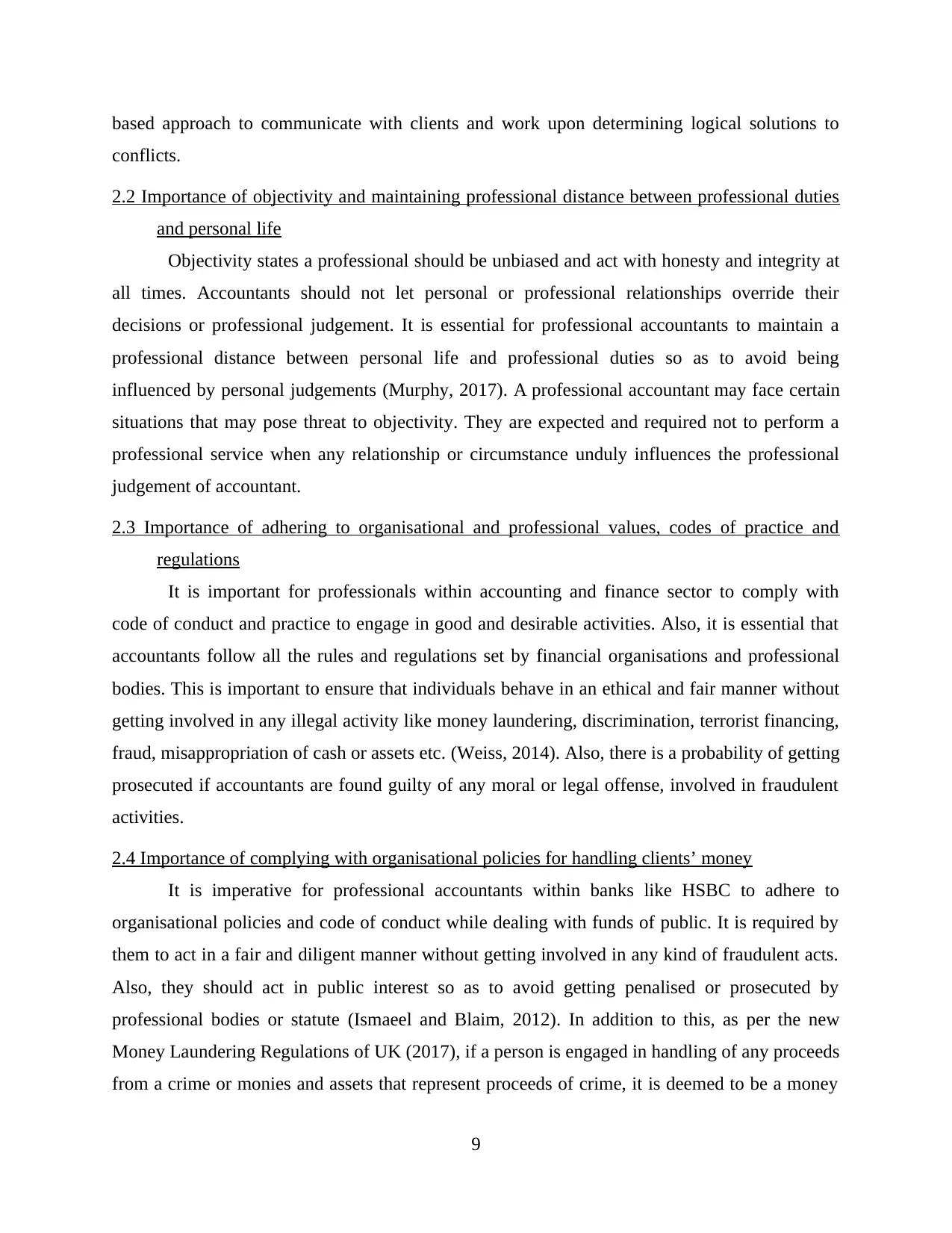
based approach to communicate with clients and work upon determining logical solutions to
conflicts.
2.2 Importance of objectivity and maintaining professional distance between professional duties
and personal life
Objectivity states a professional should be unbiased and act with honesty and integrity at
all times. Accountants should not let personal or professional relationships override their
decisions or professional judgement. It is essential for professional accountants to maintain a
professional distance between personal life and professional duties so as to avoid being
influenced by personal judgements (Murphy, 2017). A professional accountant may face certain
situations that may pose threat to objectivity. They are expected and required not to perform a
professional service when any relationship or circumstance unduly influences the professional
judgement of accountant.
2.3 Importance of adhering to organisational and professional values, codes of practice and
regulations
It is important for professionals within accounting and finance sector to comply with
code of conduct and practice to engage in good and desirable activities. Also, it is essential that
accountants follow all the rules and regulations set by financial organisations and professional
bodies. This is important to ensure that individuals behave in an ethical and fair manner without
getting involved in any illegal activity like money laundering, discrimination, terrorist financing,
fraud, misappropriation of cash or assets etc. (Weiss, 2014). Also, there is a probability of getting
prosecuted if accountants are found guilty of any moral or legal offense, involved in fraudulent
activities.
2.4 Importance of complying with organisational policies for handling clients’ money
It is imperative for professional accountants within banks like HSBC to adhere to
organisational policies and code of conduct while dealing with funds of public. It is required by
them to act in a fair and diligent manner without getting involved in any kind of fraudulent acts.
Also, they should act in public interest so as to avoid getting penalised or prosecuted by
professional bodies or statute (Ismaeel and Blaim, 2012). In addition to this, as per the new
Money Laundering Regulations of UK (2017), if a person is engaged in handling of any proceeds
from a crime or monies and assets that represent proceeds of crime, it is deemed to be a money
9
conflicts.
2.2 Importance of objectivity and maintaining professional distance between professional duties
and personal life
Objectivity states a professional should be unbiased and act with honesty and integrity at
all times. Accountants should not let personal or professional relationships override their
decisions or professional judgement. It is essential for professional accountants to maintain a
professional distance between personal life and professional duties so as to avoid being
influenced by personal judgements (Murphy, 2017). A professional accountant may face certain
situations that may pose threat to objectivity. They are expected and required not to perform a
professional service when any relationship or circumstance unduly influences the professional
judgement of accountant.
2.3 Importance of adhering to organisational and professional values, codes of practice and
regulations
It is important for professionals within accounting and finance sector to comply with
code of conduct and practice to engage in good and desirable activities. Also, it is essential that
accountants follow all the rules and regulations set by financial organisations and professional
bodies. This is important to ensure that individuals behave in an ethical and fair manner without
getting involved in any illegal activity like money laundering, discrimination, terrorist financing,
fraud, misappropriation of cash or assets etc. (Weiss, 2014). Also, there is a probability of getting
prosecuted if accountants are found guilty of any moral or legal offense, involved in fraudulent
activities.
2.4 Importance of complying with organisational policies for handling clients’ money
It is imperative for professional accountants within banks like HSBC to adhere to
organisational policies and code of conduct while dealing with funds of public. It is required by
them to act in a fair and diligent manner without getting involved in any kind of fraudulent acts.
Also, they should act in public interest so as to avoid getting penalised or prosecuted by
professional bodies or statute (Ismaeel and Blaim, 2012). In addition to this, as per the new
Money Laundering Regulations of UK (2017), if a person is engaged in handling of any proceeds
from a crime or monies and assets that represent proceeds of crime, it is deemed to be a money
9
⊘ This is a preview!⊘
Do you want full access?
Subscribe today to unlock all pages.

Trusted by 1+ million students worldwide
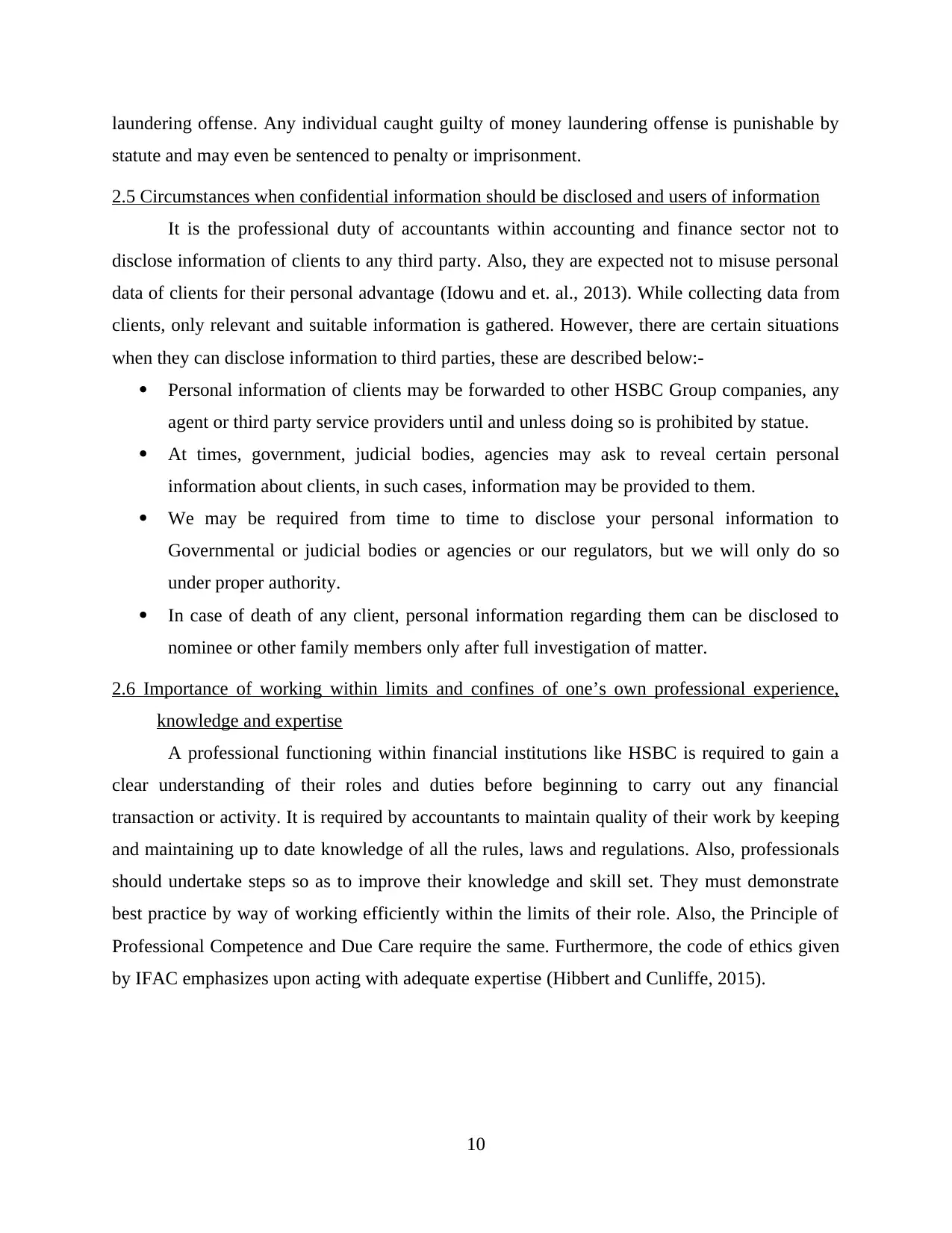
laundering offense. Any individual caught guilty of money laundering offense is punishable by
statute and may even be sentenced to penalty or imprisonment.
2.5 Circumstances when confidential information should be disclosed and users of information
It is the professional duty of accountants within accounting and finance sector not to
disclose information of clients to any third party. Also, they are expected not to misuse personal
data of clients for their personal advantage (Idowu and et. al., 2013). While collecting data from
clients, only relevant and suitable information is gathered. However, there are certain situations
when they can disclose information to third parties, these are described below:-
Personal information of clients may be forwarded to other HSBC Group companies, any
agent or third party service providers until and unless doing so is prohibited by statue.
At times, government, judicial bodies, agencies may ask to reveal certain personal
information about clients, in such cases, information may be provided to them.
We may be required from time to time to disclose your personal information to
Governmental or judicial bodies or agencies or our regulators, but we will only do so
under proper authority.
In case of death of any client, personal information regarding them can be disclosed to
nominee or other family members only after full investigation of matter.
2.6 Importance of working within limits and confines of one’s own professional experience,
knowledge and expertise
A professional functioning within financial institutions like HSBC is required to gain a
clear understanding of their roles and duties before beginning to carry out any financial
transaction or activity. It is required by accountants to maintain quality of their work by keeping
and maintaining up to date knowledge of all the rules, laws and regulations. Also, professionals
should undertake steps so as to improve their knowledge and skill set. They must demonstrate
best practice by way of working efficiently within the limits of their role. Also, the Principle of
Professional Competence and Due Care require the same. Furthermore, the code of ethics given
by IFAC emphasizes upon acting with adequate expertise (Hibbert and Cunliffe, 2015).
10
statute and may even be sentenced to penalty or imprisonment.
2.5 Circumstances when confidential information should be disclosed and users of information
It is the professional duty of accountants within accounting and finance sector not to
disclose information of clients to any third party. Also, they are expected not to misuse personal
data of clients for their personal advantage (Idowu and et. al., 2013). While collecting data from
clients, only relevant and suitable information is gathered. However, there are certain situations
when they can disclose information to third parties, these are described below:-
Personal information of clients may be forwarded to other HSBC Group companies, any
agent or third party service providers until and unless doing so is prohibited by statue.
At times, government, judicial bodies, agencies may ask to reveal certain personal
information about clients, in such cases, information may be provided to them.
We may be required from time to time to disclose your personal information to
Governmental or judicial bodies or agencies or our regulators, but we will only do so
under proper authority.
In case of death of any client, personal information regarding them can be disclosed to
nominee or other family members only after full investigation of matter.
2.6 Importance of working within limits and confines of one’s own professional experience,
knowledge and expertise
A professional functioning within financial institutions like HSBC is required to gain a
clear understanding of their roles and duties before beginning to carry out any financial
transaction or activity. It is required by accountants to maintain quality of their work by keeping
and maintaining up to date knowledge of all the rules, laws and regulations. Also, professionals
should undertake steps so as to improve their knowledge and skill set. They must demonstrate
best practice by way of working efficiently within the limits of their role. Also, the Principle of
Professional Competence and Due Care require the same. Furthermore, the code of ethics given
by IFAC emphasizes upon acting with adequate expertise (Hibbert and Cunliffe, 2015).
10
Paraphrase This Document
Need a fresh take? Get an instant paraphrase of this document with our AI Paraphraser
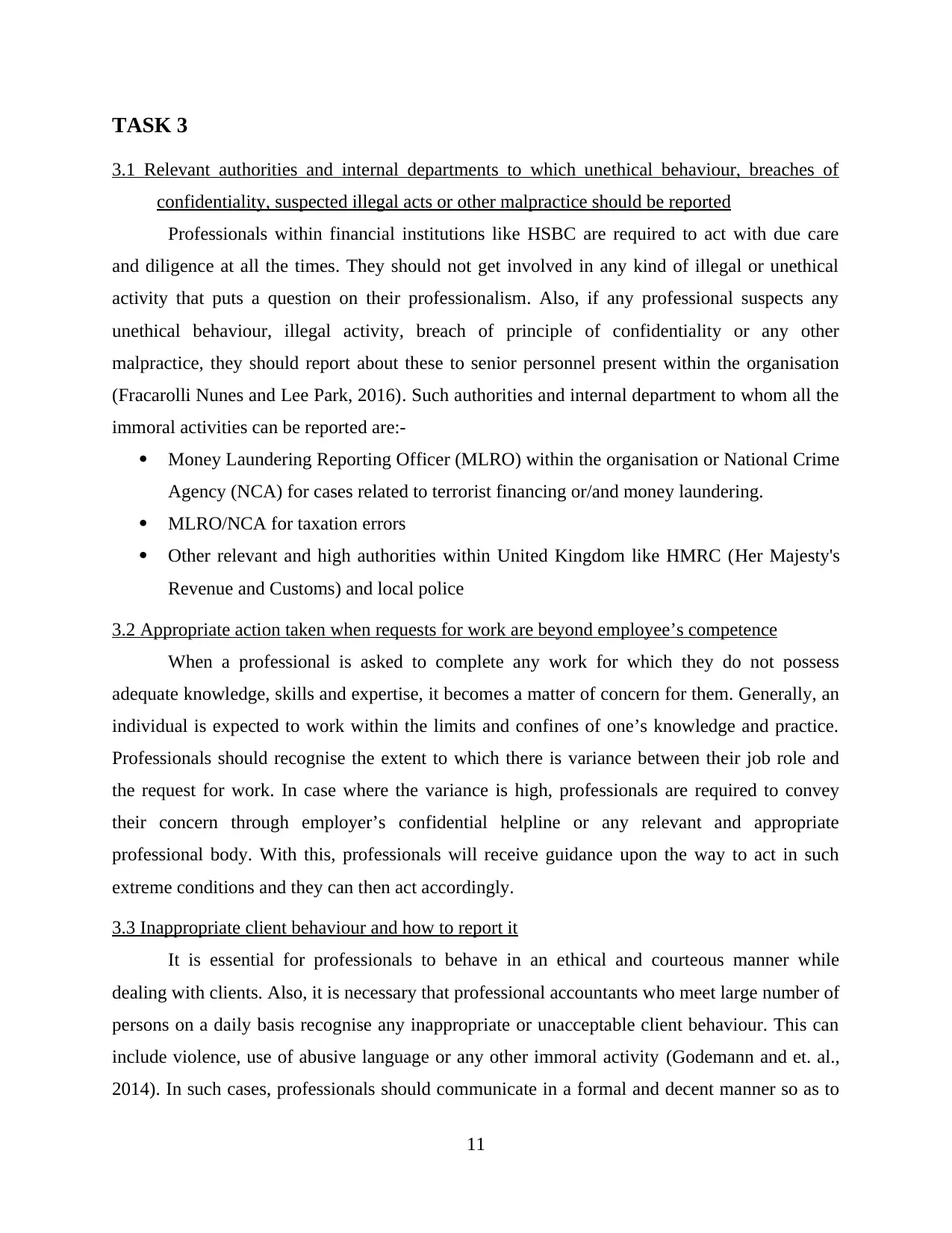
TASK 3
3.1 Relevant authorities and internal departments to which unethical behaviour, breaches of
confidentiality, suspected illegal acts or other malpractice should be reported
Professionals within financial institutions like HSBC are required to act with due care
and diligence at all the times. They should not get involved in any kind of illegal or unethical
activity that puts a question on their professionalism. Also, if any professional suspects any
unethical behaviour, illegal activity, breach of principle of confidentiality or any other
malpractice, they should report about these to senior personnel present within the organisation
(Fracarolli Nunes and Lee Park, 2016). Such authorities and internal department to whom all the
immoral activities can be reported are:-
Money Laundering Reporting Officer (MLRO) within the organisation or National Crime
Agency (NCA) for cases related to terrorist financing or/and money laundering.
MLRO/NCA for taxation errors
Other relevant and high authorities within United Kingdom like HMRC (Her Majesty's
Revenue and Customs) and local police
3.2 Appropriate action taken when requests for work are beyond employee’s competence
When a professional is asked to complete any work for which they do not possess
adequate knowledge, skills and expertise, it becomes a matter of concern for them. Generally, an
individual is expected to work within the limits and confines of one’s knowledge and practice.
Professionals should recognise the extent to which there is variance between their job role and
the request for work. In case where the variance is high, professionals are required to convey
their concern through employer’s confidential helpline or any relevant and appropriate
professional body. With this, professionals will receive guidance upon the way to act in such
extreme conditions and they can then act accordingly.
3.3 Inappropriate client behaviour and how to report it
It is essential for professionals to behave in an ethical and courteous manner while
dealing with clients. Also, it is necessary that professional accountants who meet large number of
persons on a daily basis recognise any inappropriate or unacceptable client behaviour. This can
include violence, use of abusive language or any other immoral activity (Godemann and et. al.,
2014). In such cases, professionals should communicate in a formal and decent manner so as to
11
3.1 Relevant authorities and internal departments to which unethical behaviour, breaches of
confidentiality, suspected illegal acts or other malpractice should be reported
Professionals within financial institutions like HSBC are required to act with due care
and diligence at all the times. They should not get involved in any kind of illegal or unethical
activity that puts a question on their professionalism. Also, if any professional suspects any
unethical behaviour, illegal activity, breach of principle of confidentiality or any other
malpractice, they should report about these to senior personnel present within the organisation
(Fracarolli Nunes and Lee Park, 2016). Such authorities and internal department to whom all the
immoral activities can be reported are:-
Money Laundering Reporting Officer (MLRO) within the organisation or National Crime
Agency (NCA) for cases related to terrorist financing or/and money laundering.
MLRO/NCA for taxation errors
Other relevant and high authorities within United Kingdom like HMRC (Her Majesty's
Revenue and Customs) and local police
3.2 Appropriate action taken when requests for work are beyond employee’s competence
When a professional is asked to complete any work for which they do not possess
adequate knowledge, skills and expertise, it becomes a matter of concern for them. Generally, an
individual is expected to work within the limits and confines of one’s knowledge and practice.
Professionals should recognise the extent to which there is variance between their job role and
the request for work. In case where the variance is high, professionals are required to convey
their concern through employer’s confidential helpline or any relevant and appropriate
professional body. With this, professionals will receive guidance upon the way to act in such
extreme conditions and they can then act accordingly.
3.3 Inappropriate client behaviour and how to report it
It is essential for professionals to behave in an ethical and courteous manner while
dealing with clients. Also, it is necessary that professional accountants who meet large number of
persons on a daily basis recognise any inappropriate or unacceptable client behaviour. This can
include violence, use of abusive language or any other immoral activity (Godemann and et. al.,
2014). In such cases, professionals should communicate in a formal and decent manner so as to
11
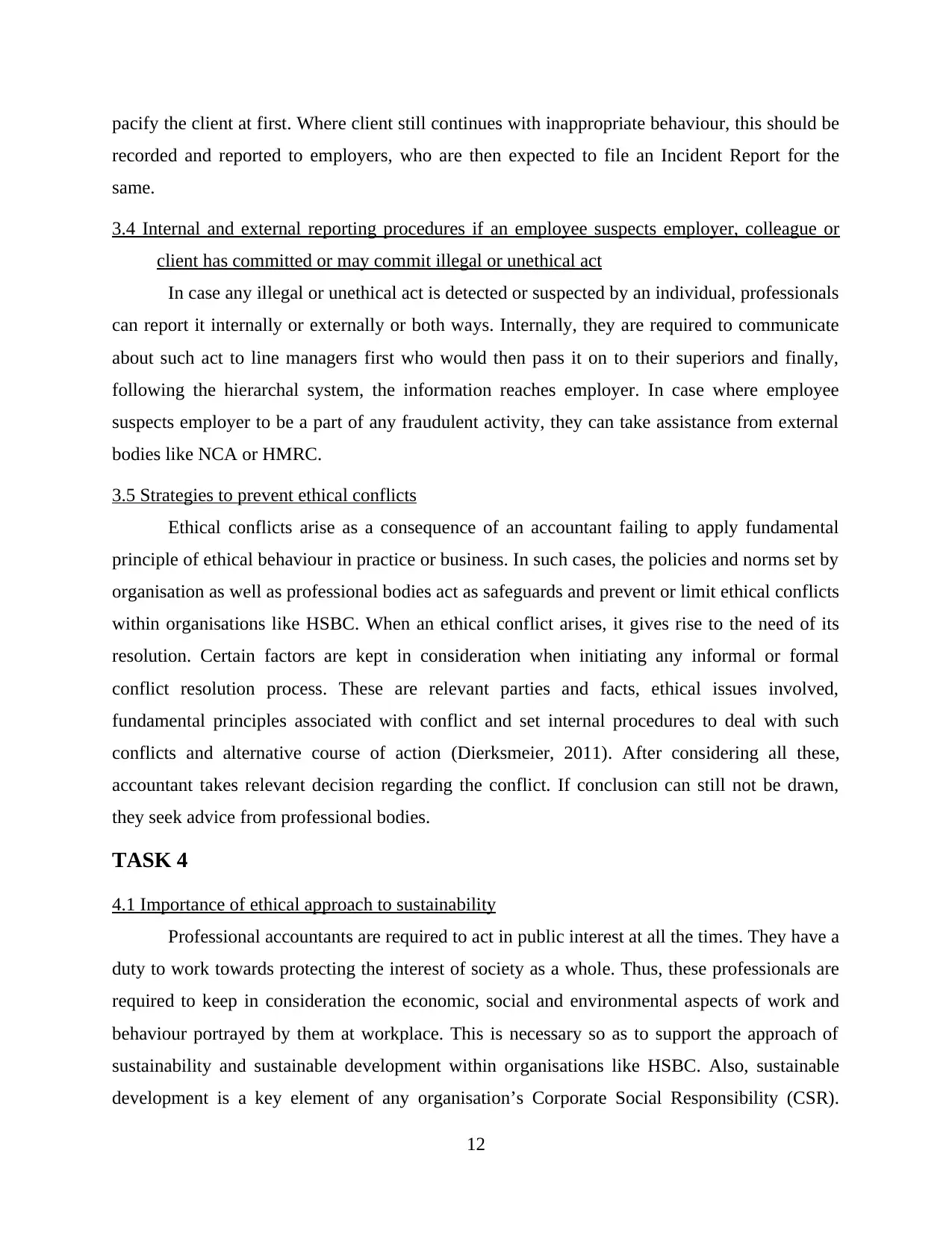
pacify the client at first. Where client still continues with inappropriate behaviour, this should be
recorded and reported to employers, who are then expected to file an Incident Report for the
same.
3.4 Internal and external reporting procedures if an employee suspects employer, colleague or
client has committed or may commit illegal or unethical act
In case any illegal or unethical act is detected or suspected by an individual, professionals
can report it internally or externally or both ways. Internally, they are required to communicate
about such act to line managers first who would then pass it on to their superiors and finally,
following the hierarchal system, the information reaches employer. In case where employee
suspects employer to be a part of any fraudulent activity, they can take assistance from external
bodies like NCA or HMRC.
3.5 Strategies to prevent ethical conflicts
Ethical conflicts arise as a consequence of an accountant failing to apply fundamental
principle of ethical behaviour in practice or business. In such cases, the policies and norms set by
organisation as well as professional bodies act as safeguards and prevent or limit ethical conflicts
within organisations like HSBC. When an ethical conflict arises, it gives rise to the need of its
resolution. Certain factors are kept in consideration when initiating any informal or formal
conflict resolution process. These are relevant parties and facts, ethical issues involved,
fundamental principles associated with conflict and set internal procedures to deal with such
conflicts and alternative course of action (Dierksmeier, 2011). After considering all these,
accountant takes relevant decision regarding the conflict. If conclusion can still not be drawn,
they seek advice from professional bodies.
TASK 4
4.1 Importance of ethical approach to sustainability
Professional accountants are required to act in public interest at all the times. They have a
duty to work towards protecting the interest of society as a whole. Thus, these professionals are
required to keep in consideration the economic, social and environmental aspects of work and
behaviour portrayed by them at workplace. This is necessary so as to support the approach of
sustainability and sustainable development within organisations like HSBC. Also, sustainable
development is a key element of any organisation’s Corporate Social Responsibility (CSR).
12
recorded and reported to employers, who are then expected to file an Incident Report for the
same.
3.4 Internal and external reporting procedures if an employee suspects employer, colleague or
client has committed or may commit illegal or unethical act
In case any illegal or unethical act is detected or suspected by an individual, professionals
can report it internally or externally or both ways. Internally, they are required to communicate
about such act to line managers first who would then pass it on to their superiors and finally,
following the hierarchal system, the information reaches employer. In case where employee
suspects employer to be a part of any fraudulent activity, they can take assistance from external
bodies like NCA or HMRC.
3.5 Strategies to prevent ethical conflicts
Ethical conflicts arise as a consequence of an accountant failing to apply fundamental
principle of ethical behaviour in practice or business. In such cases, the policies and norms set by
organisation as well as professional bodies act as safeguards and prevent or limit ethical conflicts
within organisations like HSBC. When an ethical conflict arises, it gives rise to the need of its
resolution. Certain factors are kept in consideration when initiating any informal or formal
conflict resolution process. These are relevant parties and facts, ethical issues involved,
fundamental principles associated with conflict and set internal procedures to deal with such
conflicts and alternative course of action (Dierksmeier, 2011). After considering all these,
accountant takes relevant decision regarding the conflict. If conclusion can still not be drawn,
they seek advice from professional bodies.
TASK 4
4.1 Importance of ethical approach to sustainability
Professional accountants are required to act in public interest at all the times. They have a
duty to work towards protecting the interest of society as a whole. Thus, these professionals are
required to keep in consideration the economic, social and environmental aspects of work and
behaviour portrayed by them at workplace. This is necessary so as to support the approach of
sustainability and sustainable development within organisations like HSBC. Also, sustainable
development is a key element of any organisation’s Corporate Social Responsibility (CSR).
12
⊘ This is a preview!⊘
Do you want full access?
Subscribe today to unlock all pages.

Trusted by 1+ million students worldwide
1 out of 14
Related Documents
Your All-in-One AI-Powered Toolkit for Academic Success.
+13062052269
info@desklib.com
Available 24*7 on WhatsApp / Email
![[object Object]](/_next/static/media/star-bottom.7253800d.svg)
Unlock your academic potential
Copyright © 2020–2026 A2Z Services. All Rights Reserved. Developed and managed by ZUCOL.





